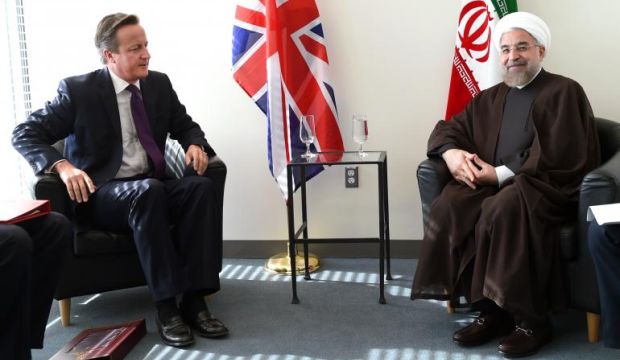
UK Prime Minister David Cameron (L) meets with Iranian President Hassan Rouhani at the United Nations during the 69th Session of the UN General Assembly, in New York City, New York, USA, on September 24, 2014. (Reuters/ Timothy A Clarey/Pool)
London, Asharq Al-Awsat—Iran’s President Hassan Rouhani and British Prime Minister David Cameron met in New York on Wednesday, in the first meeting between British and Iranian leaders since Iran’s 1979 revolution.
The meeting between the two leaders, who were in New York to attend the UN General Assembly meeting, marks an important step in the rebuilding of relations between the two countries, which have been characterized by tensions and bitterness—especially on the Iranian side—since 1979.
Iran and the UK recently agreed to reopen their embassies in Tehran and London, after the British embassy in Iran was shut down in protest at its ransacking by an angry mob in 2011.
A source close to the Iranian government, speaking on condition of anonymity, said the tone of the meeting was courteous, and that the two men discussed a number of topics, including some that had not been agreed on in advance.
The source did not rule out the verbal invitation to visit each other’s capitals being mentioned at the end of the meeting.
One of Rouhani’s aides, Hamid Abutalebi, said the meeting “will bring fundamental changes to Iran–EU relations as well the nuclear negotiations,” according to the semi-official ISNA news agency.
“It will be one of the biggest achievements of Dr. Rouhani’s visit to New York and it will also have an affect on Tehran–London relations,” he added.
In Iran, speculation about Rouhani’s trip has been dominated by rumors about the possibility of a meeting with US President Barack Obama.
The mere possibility of a meeting between the US and Iranian presidents led to mounting political pressure on the Rouhani administration from conservatives in Iran, until Rouhani finally ruled out a meeting during an address to some representatives of the US media on Tuesday night.
Iranian presidents have to deal with a number of foreign policy “red lines,” including contact with American and Israeli officials, either directly or at international organizations like the UN.
According to his aides, Iran’s former president Mohammad Khatami had to be ushered into a toilet to prevent him bumping into the then-US President Bill Clinton in a corridor at the UN in 1998.
Iran’s Supreme Leader Ayatollah Ali Khamenei recently reasserted the taboo against contact with American officials, limiting it to nuclear talks, and only up to the foreign minister level.
However, despite the continuing rupture between the US and Iran, analysts say Iranian efforts to repair relations with the UK represent a major step in attempts to bolster ties with the West in general.
Ali Bigdeli, a political analyst based in Tehran, told Asharq Al-Awsat: “Preparations for this meeting had been in place for a while and are indicative of a tangible shift in both Iran and the West’s approach in dealing with the Iranian issue”.
Bigdeli added he was doubtful the official line that the meeting was focused on coordinating efforts against the Islamic State of Iraq and Syria (ISIS) represented the whole truth, given the approaching deadline of the nuclear talks between Iran and six world powers.
Despite an interim accord struck last year between Iran and the P5+1 (the five permanent members of the UN Security Council plus Germany), time is running out for a comprehensive agreement on the Iranian nuclear program. While Iran insists the program is entirely peaceful, the US and its allies have sought to limit Iran’s capacity to enrich uranium, fearing it could be used for the construction of an atomic bomb.
At present, talks remain stalled, while a deadline for a final settlement, November 24, is fast approaching.
